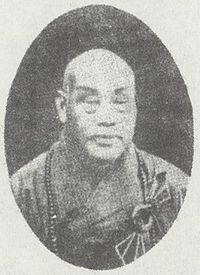Views
Yuányīng 圓瑛 (1878-1953)
|
| Notable Associates: |
|
Yuányīng 圓瑛 (1878-1953) was a towering figure of Republican Buddhism, and a critic of Tàixū's more radical suggestions for reform. He was president of the Chinese Buddhist Association 中國佛教會 from 1928 to 1937. He was also the abbot of a number of important temples in the Jiāngnán 江南 region.
Biography
Both of Yuányīng's parents died when he was five. At the age of six he began education at a classical academy. He earned his Xiūcái 秀才 Degree at 16. At 18 he became seriously ill and vowed that if he were to recover he would ordain as a monk. The following year he recovered and took tonsured under Zēngxī shàngrén 增西上人 at Méifēng Temple 梅峰寺. He was ordained under Miàolián 妙蓮 at Yǒngquán Temple 湧泉寺 in May of 1897 (4 Guāngxù 光緒 23).
Yuányīng studied asceticism and ritual under Dáběn 達本, abbot of Chóngshèng Temple 崇聖寺 on Great Snowy Peak 大雪峰. After this, Yuányīng traveled to study Chán with Yěkāi 冶開, abbot of Chángzhōu's 常州 Tiānníng Temple 天寧寺. He stayed there until April, 1903 (3 Guāngxù 光緒 29), at which point he went to Tiāntóng Temple 天童寺 in Níngbō 寧波, where he studied with Jìchán 寄禪.
In July or August of 1906 (6 Guāngxù 光緒 32) Yuányīng received dharma transmission from Cíyùn 慈運 of Níngbō's Qītǎ Bàoēn Temple 七塔報恩寺, making him a 40th-generation holder of the Línjì 臨濟 lineage. That same year, Yuányīng met Tàixū 太虛, who had come to Tiāntóng Temple to receive the precepts.
In 1912, Yuányīng accompanied Jìchán to Shànghǎi 上海, where he joined the latter as a participant in the newly-formed Chinese General Buddhist Association 中華佛教總會.
In November, 1914, Yuányīng traveled to South and Southeast Asia, visiting Buddhist communities in Sri Lanka, India, Burma, Malaysia, and Singapore.
In the 1920s, Yuányīng served as abbot of a number of different temples. He became abbot of Quánzhōu's 泉州 Kāiyuán Temple 開元寺 in March of 1924, and abbot of Chóngshèng Temple in October 1928. He became abbot of Bàoēn Temple in 1929, and abbot of Tāintóng Temple in February, 1930.
In 1928, Yuányīng was elected chairman of the Chinese Buddhist Association 中國佛教會, a position he held (with a brief interruption in 1931) until the Association ceased to function with the Second Sino-Japanese War. During the war, he helped organize a monastic defense force, composed of members of the Young Men's Buddhist Associations 佛教青年會 of the Jiāngnán 江南 region.
In 1938, Yuányīng once again traveled to Southeast Asia, returning to Shànghǎi in August. During the Second Sino-Japanese War, he lived at the Yuánmíng Lecture Hall 圓明講堂. At this point in his life he began teaching and writing almost exclusively on the Śūraṃgama Sūtra 楞嚴經.
Important Works
- Yuányīng's oeuvre is extensive. Much of his work is available on-line, see 圓瑛大師網路專輯
References
- Shì Dōngchū 釋東初. Zhōngguó Fójiào jìndài shǐ 中國佛教近代史 (A History of Early Contemporary Chinese Buddhism), in Dōngchū lǎorén quánjí 東初老人全集 (Complete Collection of Old Man Dongchu), vols. 1-2. Taipei: Dongchu, 1974 Pp. 2.804-805.
- Yú Língbō 于凌波, ed. Xiàndài Fójiào rénwù cídiǎn 現代佛教人物辭典 (A Dictionary of Modern Buddhist Persons), 2 vols. Taipei: Foguang, 2004. Pp. 1.1267b-7a.
